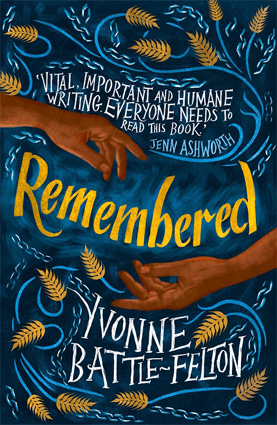“Remembered” begins with a newspaper clipping from 1910 recounting a tragic event where a black man drove a streetcar into a Philadelphia department store. We then follow the near hallucinatory experience as the driver Edward's mother Ms Spring rushes to his side in the hospital alongside the ghost of her sister Tempe. Though this calamitous day is already filled with drama and intrigue where Edward is accused of intentionally crashing the streetcar amidst his rumoured involvement with the distempered local union, his story is only the backdrop for the time Ms Spring spends with him. The novel primarily concerns her disclosing to her son the true story of his origins and her own challenging journey from being born as a slave on a plantation to freedom. She feels it's important that he knows and understands this personal history because “Most of what I’m about to tell you ain’t in no history book, no newspaper article, no encyclopedia. There’s a whole heap of stories don’t ever get told.” This novel tells a story which is moving and surprising in many ways showing the complex mentality and relationships which develop amidst the horrors of slavery. It's an impactful, uniquely told tale.
I really admire it when an author is able to portray a situation of grave moral complexity through characters who take egregious action because they are in extreme circumstances. I've not read many novels that dare to depict such a story. One of the only examples I can think of is Anoshi Irani's tremendous novel “The Parcel” which is told from the point of view of a hijra who considers it her duty to psychologically prepare newly purchased adolescent girls for a life of sexual slavery. Here a character performs an evil task but she is doing it out of charitable necessity because the only other option (as she sees it) is death. A character of equal complexity is depicted in Yvonne Battle-Felton's novel in the figure of Mama Skins. She's determined to prevent more children from being born into slavery on the plantation and takes extreme measures to stop this from happening. It presents a great challenge for readers because they are at once sympathetic to her struggle but horrified by her actions. Yet this is a point of view which needs to be voiced to better understand the individual realities of our complex socio-economic environment. The heartbreak comes not just from the poisonous reality of slavery but the way individual options become so warped.
Perhaps it shouldn't be surprising that the nation's transition from slavery to freedom wasn't smooth or easy. Another remarkable thing this story does is show through Spring's story how information was withheld and manipulated while the Emancipation Proclamation took time to be implemented across the nation. The author has an impressive skill for conveying both the sensory and social atmosphere of Spring's journey, but there are times when the vigorous action of the circumstances becomes confusing to follow. What works impressively well is the supernatural element of the spirit of Tempe who accompanies her sister Spring. Such an element in a novel can sometimes feel tacked on or cliched, but here feels touching and natural to her experience. There's a powerful energy which propels the story forward as Spring recalls it through the difficult hours of Edward's time in hospital. This is a courageous, passionate and rousing novel that demands we consider the complexities of history.









